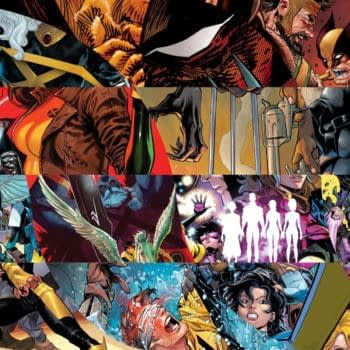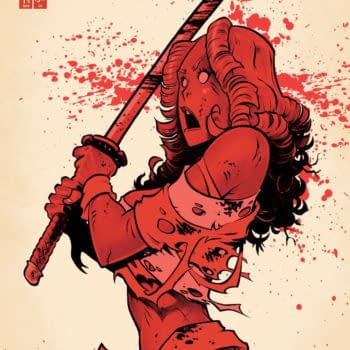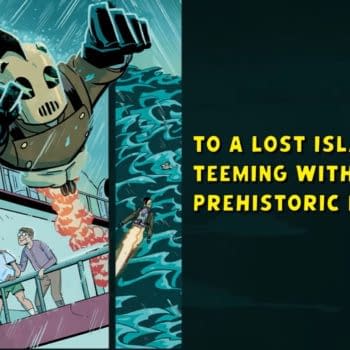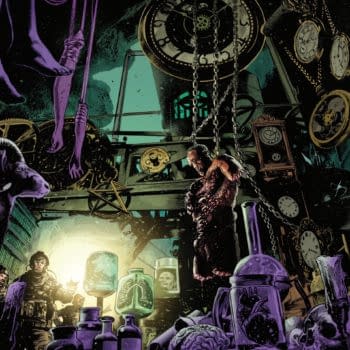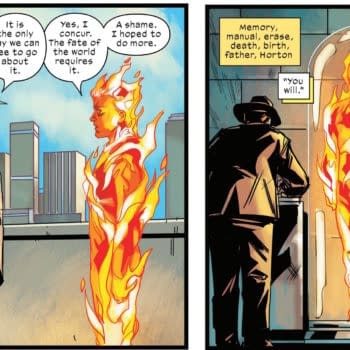Posted in: Comics, Denver Comic Con | Tagged: avatar press, darth vader, denver comic con, image comics, kieron gillen, Marvel Comics, Secret Wars, uber, Wicked + Divine
Live! From The Kieron Gillen Spotlight Panel At Denver Comic Con – Phonogram, WicDiv, Marvel Books And Magic(UPDATE)

Gillen took over the panel and asked if anyone knew who he was, to laughter. He threatened to read poetry and mentioned being on a panel with Matt Fraction where they just made the audience listen to music. He's very busy right now, he said, for which he's grateful. He's doing a Marvel book, Darth Vader, and also Siege, which ties into Secret Wars, and compared it as a "Night's Watch" type book.
He's also doing Angela, set in the 1602 Marvel world, and he gets to use his English Lit degree to come up with literary gags, he said.
His Image book, Wicked + Divine is going very well, and they'll be bringing guests on for 12-17, and though those are not standalone stories, they'll be pushing the main plot forward. Jamie McKelvie and he are doing Phonogram, and McKelvie has just finished the second cover. They are possibly going to have Jamie doing some backup pages as they go along.
His other Image book, The Ludocrats, is going to be a bit Asterix and Obelix, based on an idea he's had since 2001.
His Avatar books include Uber, soon to be hid longest running comic. At # 27, they'll have a pause until 2016 to work out where things are going from there. Also it'll buy him some research time, he said.
Mercury Heat is a series he wrote the first 6 issues for in 2010, and the first couple of issues have been redrawn several times by different artists, making it an interesting project. It was inspired by a few years ago seeing many of his female friends leaving their 20s and hitting a glass ceiling in the work world. This made him want to write a story with a female lead of this kind.
Asked about Phonogram's direction, Gillen described Rue Brittannia as a basic hero-quest narrative, more simple than people think. The second volume of Phonogram was more complicated chronologically, and had Jamie McKelvie hanging the pages on the wall in order. He said that the new volume will counteract any elitist ideas of music. It poses the question of whether things given up in previous volumes were worth it. It's going to have more "leads" rather than just focusing on Emily and Clare.

A fan in Ameratsu makeup asked him about women in comics, and why he is writing about far more diverse things than many of the male comic writers of his generation. Gillen said that sometimes he "backloads" his work to contain more ideas that take more re-reading, and definitely wants to contradict the idea that he does anything in his stories just to sell comics. He writes about his friends, his lovers, and people he knows, and feels his social group is reflected in his work. He lives in South London and he set Laurie's home in his neighborhood and made it something he'd feel natural with. He feels that he and McKelvie grew up with some diversity in music too. It's not something he analyzes a lot. He thinks you need to "put the work in" and talk with people. He talked with Trans people before writing the character Cassandra.
Asked if he has problems getting permission for using lyrics in his works, he said, "Don't tell anybody" as a strategy, to laughter. Phonogram is treated as piece of criticism, a piece of music journalism. The use is not decoration for the comic, but it is about music. He defends the usage by describing is as a piece of "weird weird weird music journalism". When asked at San Diego if they were worried about being sued, they said "Yes!" They don't tend to quote people, he said, and they misquote and use fragments when they are being negative. When they quote properly, it's usually complimentary, so they are more likely to get away with it. The third volume of Phonogram is about music in the 80's. There's a lot of homage to music video sequences, such as Material Girl by Madonna. He thinks the more successful they are, the more likely it is that someone will sue them.
Asked about collaboration between he and McKelvie, he said in Journey into Mystery and Young Avengers, he wrote in modified Marvel method. He'd do the beat and some of the dialogue. They'd have very normal sequences so that by contrast super powers really stood out as unusual. They also vowed never to repeat themselves. Mentioning the "diagram" from Issue 14 of Young Avengers, he said that it's often compared to Chris Ware's work, but it's actually based on the diagrams on the back of plane seats. They've worked together so well for so long now that Gillen really values that communication. If he worked with a new artist now, he wouldn't even know what to say, he said.
When coming up with music for his books, he said he thinks about the book and music ideas arise then, versus trying to find music that works. Pulling out his phone, he played some music that a friend had forwarded, a Sex Pistols mash up, to him this morning, and that might make its way into a comic. He listens to songs on shuffle "like a tarot deck". He finds himself "possessed by songs" at strange times, and on repeat. That made him relate to the character Dionysus (in Wicked + Divine), who's trapped in a repeat of experiences.
Asked where he stood on Oasis vs. Blur, he said the only sane response to that conflict was Pulp.
Asked a goth question of Slow Death vs. My Bloody Valentine, he said My Bloody Valentine right away.
Gillen was asked how he felt about seeing his character cosplayed on Eurovision. He mentioned seeing a fan meet up of Young Avengers and the idea is humbling, but it's also kind of what he wants. Seeing people dressed as the characters means the stories reached the people he wanted it to reach. It's amazing, he said. At 2pm today, he's trying to get people for a group photo at the cosplay stage for people who are cosplaying his characters.
Compared to Alan Moore writing about magic, Gillen was asked about his approach to magic. He narrated Alan Moore's famous story of "meeting" John Constantine at a bar. That is similar to his experience. Magic is "symbolism weaponized" he said. You are putting things together to make a connection on an emotional level. Superstition can be connected. How do you turn emotions about music into an "actual thing"? he asked. That's part of his process.
Asked if he's going to be doing Marvel books after Secret Wars, he said he's actually not for awhile. He's doing Darth Vader, and with all the Image books, he has a very busy schedule. He's going to "have a break in his Marvel Universe". He's also not saying "never" in terms of doing more. It's a "good way to end this stage of his career", he said, though it may not turn out that way.
Asked to talk more about his work on Darth Vader, he said he's just finished issue 10. The idea of doing a book on one of the greatest villains of all time in Pop Culture was very appealing to him. The series has an "improvisational energy" to it. There's a natural "end" to Darth Vader, though because this story is set in the three years between the films.
Kieron Gillen will continue signing at the Avatar Booth this weekend at Denver Comic Con.










